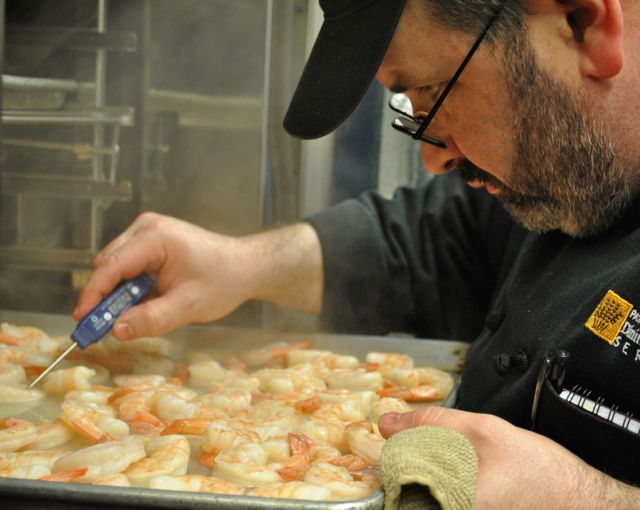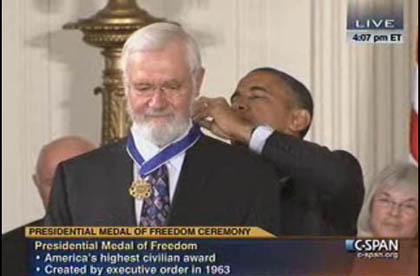Page 615 • (6,229 results in 0.032 seconds)
-
specific title designated by the academic unit. (1 to 4) MATH 389 : Special Topics in Mathematics To provide undergraduate students with new, one-time, and developing courses not yet available in the regular curriculum. The title will be listed on the student term-based record as ST: followed by the specific title designated by the academic unit. (1 to 4) MATH 422 : Mathematical Modeling This course introduces students to mathematical modeling of various problems in biology, environmental science, and
-

cook for themselves. Some, like applied physics and computer science double major Tim Hurd ’13, who has lived off campus for more than a year, find themselves reinventing the meaning of cooking. Hurd draws his food-spiration from a book his grandma and mom bought him in high school. The book, “A Man, a Can, a Plan,” epitomizes a man’s approach to cooking, with dense laminated cardboard pages and recipes that require a large number of canned and pre-prepared food items – but for Hurd it’s perfect
-
, and gender, exploring what social forces shape individuals' differentiated access to society's valued resources. Prerequisite: SOCI 101, CRIM 102, or consent of instructor. (4) SOCI 332 : Race and Racism - ES A critical examination of race and racism in the United States. The course will explore the social construction of race and how racism shapes social institutions, such as the economy, education, and criminal justice. Prerequisite: SOCI 101, CRIM 102, or consent of instructor. (4) SOCI 336
-
to National Geographic, 29 billion water bottles are manufactured for use by Americans every year and Americans buy more bottled water than any other nation in the world. To make these bottles manufacturers use 17 million barrels of crude oil. And only one out of six bottles make it into a recycling bin. One recycled plastic bottle can save enough energy to power a 60-watt light bulb for six hours. But it’s not just about good sustainable practices; it’s also about education. “Don’t consume your
-
situation like Darfur is occurring, Pertnoy said. “Begin with small steps, and it can have a collective impact.” Kimenyera, Pertnoy and Kleiman all agreed Thursday evening that education was key to changing the events that lead to an act of genocide. Also, Kleiman added, “get to know the people around you.” That advice was echoed at the Scandinavian Center about 12 hours later on Friday, as Carl Wilkens, the only American to remain in Rwanda during the 1994 genocide that claimed 1 million lives in three
-

interview he wasn’t sure what he wanted to do when he arrived at PLU, except to follow in the footsteps of his hero, Albert Schweitzer, the German philosopher, doctor and humanitarian who did groundbreaking health work in Africa. During that 2006 interview, the lanky, 6-foot, 7-inch Foege, credited much of his success with the help of others, and his time at PLU. “It’s such a nice place to get an education,” he said. “People who go there do not appreciate how good it really is. “I went to the UW
-
we can bring our differences to the table to build and transform community.” During a recent conversation at Northern Pacific Coffee Co., a coffee shop near PLU’s campus, Rude said she’s eager to lend that passion to PLU. “I was shaped by the values of a liberal arts education at an ELCA-affiliated university,” she said. “I benefited from learning to ask questions, living into my values, engaging difference, serving others and living in community. It was hard, and at times, I desperately needed a
-

is joyful and fun, but it’s not anything like being at the community center where homeless members in our community get hot meals.” (Photo: Sam O'Hara) Johnson says she learned to conquer her stage fright at PLU. +Enlarge Photo “I love my music and I don’t have the heart to quit it, but I feel strongly about the future of our kids and our education system. The responsibility of being a good steward is not something I take lightly. I’d like to be a lightning rod for issues surrounding people who
-

, including the “horrific” nature of the fighting in Mogadishu, but has found joy in the ways of yoga – and with Fontana as leader. “She lights up all the students,” he says. “She radiates the room.” Fontana speaks with authenticity and thoughtfulness and searches for deeper meaning in her answers. She credits PLU with giving her the tools to ask and explore all questions. (Photo: John Froschauer/PLU) Kate Fontana '08 +Enlarge Photo And she is back on campus teaching a one-credit physical education class
-

great trainings, particularly for women, that are a great way to learn, build a support group and meet great people. It takes a village. I couldn’t have done it without an incredible campaign team, a supportive partner, my parents and sister, and many, many friends, new and old, who propped me up along the way. It was really, really important for me to have a support group of other women running to bounce ideas and frustration off of. “Everyone deserves access to an education, a good job, and a
Do you have any feedback for us? If so, feel free to use our Feedback Form.


